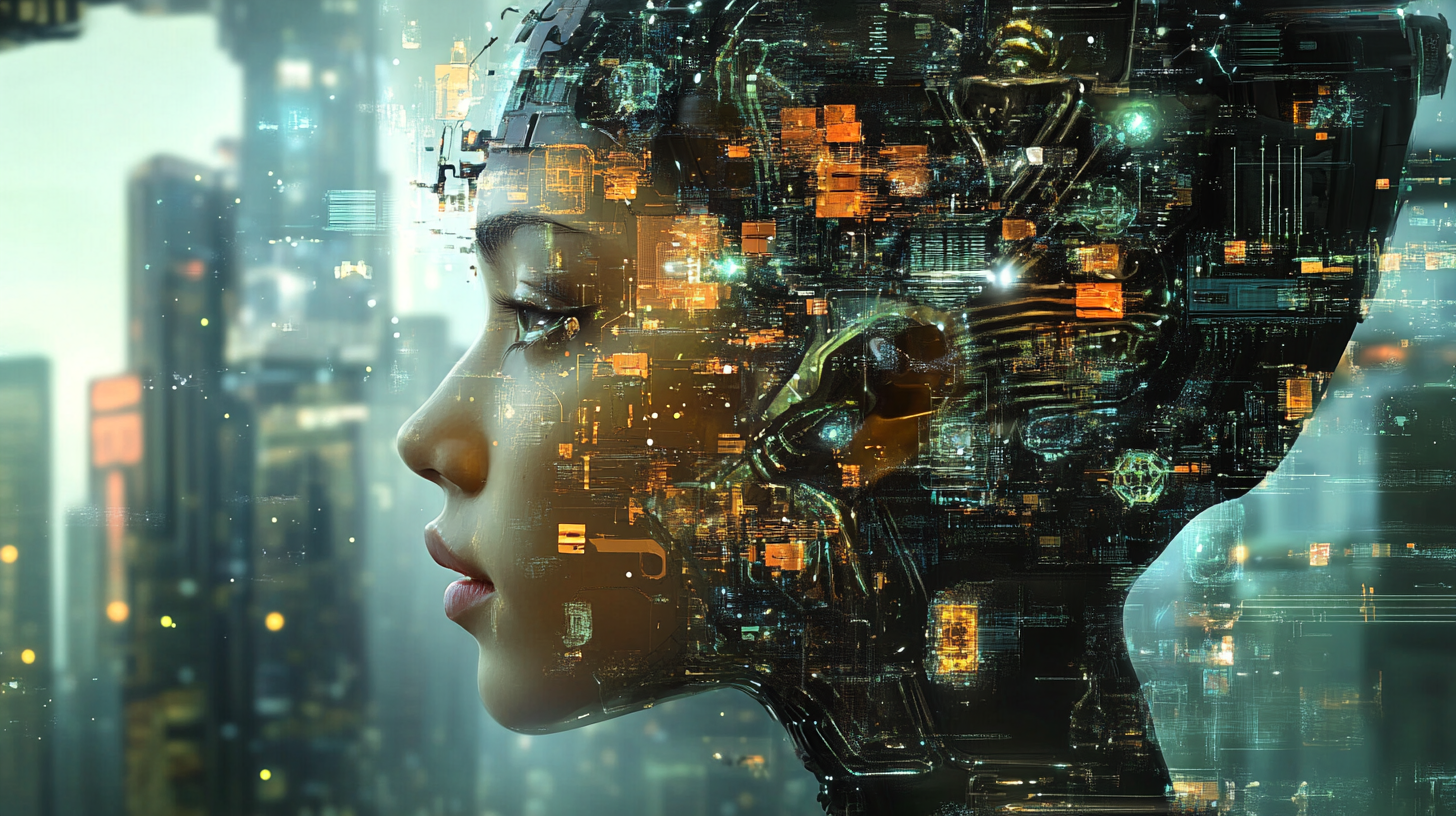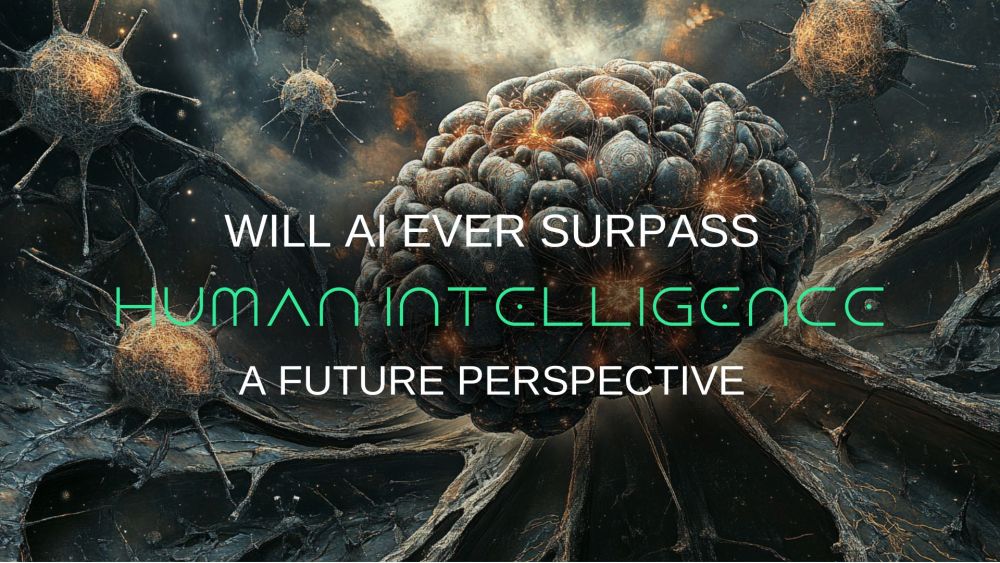Will AI Ever Surpass Human Intelligence? A Future Perspective
AI has become a big part of our everyday lives. We ask AI assistants to play our favorite songs, use autocorrect to fix typing mistakes and get personalized shopping recommendations online. AI also helps us tag friends in photos, chat with customer service chatbots, and even run autonomous vacuum cleaners in our homes.
On the other hand, human intelligence is something we're born with and start using from a very young age. We solve problems, feel emotions, and decide based on our world understanding. Unlike AI, we can show affection, change our minds, and respond to situations empathetically.
A robot can’t comfort a crying child the way a mother can or react quickly by dropping a hot object when touched. While AI can process information, it can’t feel sadness when an animal is hurt or make decisions about causes like fighting poaching unless programmed to.
Will AI ever be able to do everything humans can?
Let's examine how far AI has come, what the future might hold, and whether we’re heading toward a future in which AI could surpass human intelligence.
A Quick Look at AI’s Journey
The concept of AI dates back to the mid-20th century when scientists began developing machines that could perform simple tasks, like playing chess or solving math problems. Early AI was mostly about creating rules-based systems, machines that could follow step-by-step instructions but couldn’t learn or think for themselves.
Fast forward to today, and AI is everywhere. From voice assistants like Siri and Alexa to complex machine learning algorithms that can detect cancer or drive cars, AI has evolved from basic automation to much more sophisticated. AI can now learn from data, recognize patterns, and improve performance without human intervention.
However, it still operates within limits. While it excels at specific tasks, it lacks humans' general intelligence. This leads to the question, Can AI evolve into more than a smart tool?
Artificial General Intelligence (AGI) vs. Human Intelligence
While narrow AI is here, AGI is still theoretical. Creating an AI that can think and learn like a human is extremely difficult because human intelligence is incredibly complex. Our brains can make decisions based on incomplete information, adapt to new environments, and apply creativity and emotion to problem-solving. To understand if AI can surpass human intelligence, we need to differentiate between these two types of AI.
Narrow AI
It is the AI we have today. It’s great at doing specific tasks, like analyzing large datasets or beating humans at board games. However, narrow AI can’t adapt to new situations or think creatively as humans can. It's specialized but not versatile.
Artificial General Intelligence (AGI)
This is a more advanced form of AI. AGI would be able to learn, reason, and perform any intellectual task that a human can do. It could think and solve problems across various topics without specific programming.
Artificial Intelligence vs. Human Intelligence: A Comparison
Here’s a breakdown comparing AI and human intelligence across different areas:
Essence
Human intelligence combines various cognitive activities, allowing individuals to adapt to new circumstances and environments. On the other hand, artificial intelligence is designed to mimic human behavior and perform tasks typically done by humans.
Evolution
Human intelligence develops naturally over time through cognitive growth and life experiences. In contrast, artificial intelligence emerged from technological innovations, with key advancements attributed to pioneers like Norbert Wiener.
Functionality
Humans rely on memory, cognitive abilities, and brain functions to process information and solve problems. AI, however, processes data and executes commands using algorithms and machine learning techniques.

Pace of Operation
While humans process information at a slower rate, particularly in computational tasks, artificial intelligence can handle vast amounts of data almost instantly, making it significantly faster.
Learning Ability
Human intelligence learns from diverse experiences, emotions, and social interactions, allowing for complex and abstract thinking. AI learns primarily through exposure to data and repetitive practice but often struggles with abstract concepts.
Decision Making
Humans make decisions influenced by emotions, personal experiences, and subjective factors. In contrast, AI decision-making is purely objective, relying exclusively on analyzed data and factual information.
Perfection
Human intelligence is prone to errors and occasional oversight, reflecting the natural imperfections of the human mind. AI, by design, operates with high levels of accuracy, as fixed rules and algorithms govern its performance.
Adaptability
Humans are highly adaptable and can easily adjust to new environments or unexpected situations. AI systems, however, require significant time and effort to recalibrate and respond to unfamiliar circumstances.
Flexibility
Human intelligence excels in multitasking and managing complex decisions simultaneously. AI, in comparison, often handles one task at a time and may lack the flexibility to manage multiple or nuanced operations simultaneously.
Social Networking
Humans are inherently social beings, capable of empathy and understanding emotional cues during interactions. AI cannot fully comprehend social dynamics or respond to emotions with the same depth as humans.
Operation
Creativity and innovation are hallmarks of human intelligence, allowing individuals to think outside the box and develop groundbreaking ideas. AI focuses on optimizing performance but lacks the originality and inventiveness humans naturally possess.
The Singularity: A Point of No Return?
The idea that AI might one day surpass human intelligence is often tied to Singularity. Singularity refers to a future where AI becomes so advanced that it triggers rapid technological growth, eventually surpassing human intelligence and capabilities.
What the Experts Think
Ray Kurzweil
One of the biggest advocates of this idea is Ray Kurzweil, a futurist and Google’s Director of Engineering. Kurzweil believes that singularity could happen as early as 2045 when machines could match and exceed human cognitive abilities. He argues that once AI reaches that level, it will begin improving exponentially, leading to rapid advances that humans can’t keep up with.
Elon Musk
Elon Musk, CEO of Tesla and SpaceX, has warned about the dangers of superintelligent AI. Musk has repeatedly stated that if we’re not careful, AI could threaten humanity, especially if it surpasses human intelligence and becomes uncontrollable. His solution? Regulating AI development to ensure it aligns with human values and safety.
Yuval Noah Harari
On the other hand, Yuval Noah Harari, a historian and author of books like Sapiens and Nexus, takes a more philosophical view. Harari warns that AI could fundamentally change what it means to be human. He argues that even before AI surpasses us, it could start making unpredictable decisions that shape our societies, potentially eroding our sense of free will and control.
How Far Has AI Come
While we’re still far from the Singularity, AI has made significant strides in recent years. Technologies like deep learning, natural language processing, and neural networks have dramatically advanced AI’s capabilities. These achievements show that AI can excel at highly complex tasks that once seemed uniquely human.
However, they also highlight a key limitation. AI is still task-specific. AlphaGo can’t drive a car, and GPT-4 can’t play Go. We’re not yet at the point where AI can think across disciplines like humans. A few examples are listed here.
- DeepMind’s AlphaGo: It defeated the world’s top Go player in 2016, a feat many thought was at least a decade away.
- GPT models: Like the one you're interacting with today, it can understand and generate human language in a way that feels eerily close to human communication.
- Self-driving cars: Powered by AI, these cars are already on the roads, although imperfect.
Can AI Surpass Human Creativity and Emotions?
Creativity and emotional intelligence are where AI falls short. We can write novels, compose music, create art, and deeply empathize with others. AI, while powerful, still cannot replicate these uniquely human abilities.
AI’s Attempts at Creativity
AI has managed to create art and even write music, but these creations are typically based on patterns from existing data. AI lacks the emotional depth and inspiration that fuel human creativity, which makes its work more of an imitation than an original innovation.
Can AI Close the Gap in the Future?
Some experts believe that AI may one day bridge this gap. Sam Altman, CEO of OpenAI, suggests that AI could develop new forms of creativity that we can't yet imagine. However, for now, the emotional and innovative depth that drives true human creativity remains a distinctly human trait.
The Road Ahead
While the possibility of AI surpassing human intelligence is exciting, it also comes with significant challenges. One of the biggest concerns is ethics. If AI becomes smarter than humans, how do we ensure it acts in our best interests? Who controls AI, and how do we prevent misuse?
There’s also the issue of job displacement. As it becomes more capable, AI could replace millions of jobs, from factory workers to accountants. Conversely, AI could also create new industries and jobs we haven’t even considered. But managing this transition will be crucial.
Then there’s the question of human-AI collaboration. Rather than seeing AI as a competitor, many experts believe we should focus on how humans and AI can work together. AI could enhance human capabilities, helping us solve problems like climate change, disease, and poverty more efficiently.





